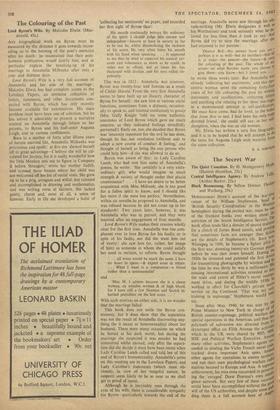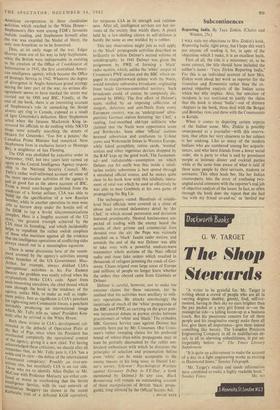The Secret War
The Quiet Canadian. By H. Montgomery Hyde' (I-famish Hamilton, 25s.) Central Intelligence Agency. By Andrew Tell)(' (Arthur Barker, 21s.) MONTGOMERY HYDE'S account of the war-linler career of Sir William Stephenson, head °` 'British Security Coordination' in the Weslern, hemisphere during the second war, must be ell' of the frankest books ever written about lee activities of the Secret Intelligence Service. Tllei book often reads like a dossier of source mate for a clutch of James Bond novels, and prov;ir/fig that sometimes facts are stranger than acl'°r are the details of Stephenson's life. Born rlq Winnipeg in 1896, he became a fighter Pilot Iris e the first war, downing twenty-six German Plag,t,, before he was shot down himself. During 1920s he invented and patented the first devie° for transmitting photographs by wireless ataci0b,Y5 the time he was thirty he was a millionaire. ensuing international activities revealed to bl' the scale and extent of Hitler's secret rearnla; ment drive, and during the middle 19305 Bt worked in effect for Churchill's private sectely service on the Continent. 'That was my 1311,4 training in espionage,' Stephenson would Is say.
thc
Soon after May, 1940, he was sent bY Prime Minister to New York in charge of ad British counter-espionage, political warfare a5 special operations in the Americas, and thus lL'is polymath of subversive war directed froul 5 skyscraper office on Fifth Avenue the activililec which in the UK were shared by MI5, SOE and Political Warfare Executive. Anl°'',„ many other activities, Stephenson's agents su'lp ceeded in stealing the Vichy French naval cocicd tracked down important Axis spies, traine,f, other agents for operations in enemy terri10,70 and ran their own psychological warfare rau,„e stations beamed to Europe and Asia. A suPre't., achievement, his men even succeeded in perietrili, ing the 'enraged' Drew Pearson's own inte_es gence network. But very few of these succeod could have been accomplished without the Vd, will of the US authorities, and despite some Paw ding there is a full account here of Mg'
American co-operation in these clandestine activitie,s which reached to the White House- Stephenson's files were among FDR's favourite bedside reading, and Stephenson himself after the war was awarded the Medal of Merit, the only non-American so to be honoured.
Thus, at an early stage of the war, Edgar Hoover went out of his way to help Stephenson, While the British were indispensable in assisting in the creation of the Office of Coordinator of Information in 1941, the first centralised Ameri- can intelligence agency, which became the Office of Strategic Service in 1942. Whatever the degree of divergence in Anglo-American grand strategy during the later part of the war, no serious dis- agreement seems to have marked the secret war carried out by OSS and BSC. Finally, at the end of the book, there is an interesting account of Stephenson's role in unmasking the Soviet atomic spy ring in Canada, exposed as a result of Igor Gouzenko's defection. Here Stephenson acted when the fatuous Mackenzie King in- structed his officials to do nothing while NKVD thugs were actually searching the streets of Ottawa for Gouzenko. 'Too hot a potato,' the Canadian Prime Minister had remarked. Now Stephenson lives in exclusive luxury at Montego Bay, a neighbour of Ian Fleming.
The OSS was abolished by executive order in September, 1945, but two years later turned up again as the Central Intelligence Agency respon- sible to the National Security Council. Mr. Tully's rather well-informed account of some of the more spectacular activities of the agency is just as good fun as the above account of BSC. From a metal coat-hanger purloined from the trash-can of a Soviet airliner, CIA was able to build up the specification of a new Russian bomber, while in another operation its men were able to burrow deep under the hostile soil of the DDR to tap a Soviet telecommunications Complex. Here is a lengthy account of the U2 story, 'the greatest triumph achieved by the CIA since its founding,' and which incidentally helps to repudiate the rather owlish simplism of those who maintain against all the evidence that the intelligence operations of conflicting sides always cancel out in a meaningless equation. There is some discussion here of the resent- ment aroused by the agency's activities among Other branches of the US Government. Mac- Arthur, for example, always disliked CIA's surreptitious activities in his Far Eastern theatre; the problem was neatly solved when his cryptanalysts broke CIA's code. Apart from such interesting anecdotes, the chief thread which runs through the book is the tendency of the agency, unlike MI6, to make as well as imple- ment policy. Just as significant is CIA's penchant
■ for right-wing anti-Communist forces, a penchant inevitably producing an international image Which, Mr. Tully tells us, 'upset' President Ken- nedy after he arrived in the White House.
Both these strains in CIA's development cul- minated in the debacle of Operation Pluto at the Bay of Pigs, since when the President has overhauled completely the operational control of the agency, giving it a new chief. Yet having acknowledged these criticisms, we should after all remember that, as Mr. Tully puts it, CIA 'has a noble end in view—the defeat of the international Communist bit conspiracy.' Possibly an over-am an-
ions aim, but manifestly CIA is on our side. _I hose who try to identify Allen Dulles or Mr.
eCone with Professor Moriarty are either con- fused oror worse in overlooking that the Soviet I_ ntelligence Service, with its vast network of totalitarian thuggery. (as shown in the recent Karlsruhe trial of a defected KGB operative),
far surpasses CIA in its strength and ruthless- ness. After all, intelligence services are but ser- vants of the society that wields them. A pistol held by a law-abiding citizen in self-defence is hardly the same as one wielded by a robber.
This last observation might just as well apply to the 'black' propaganda activities described so brilliantly in Sefton Delmer's second volume of autobiography. In 1941 Delmer was given the assignment by PWE of forming a 'black' radio section, which, unlike the 'white' output of Crossman's PWE section and the BBC which en- gaged in straightforward debate with the Nazis,
would simulate subversive broadcasts originating from inside German-controlled territory. Such broadcasts could, of course, be completely dis- avowed by HMG. The first effort of Delmer's team, staffed by an imposing collection of emigres, defectors and anti-Nazis from every European country, was an 'underground' ultra- patriotic German station featuring 'der Chef,' a ranting, foul-mouthed old-type militarist who claimed that the Nazis were opportunist scum and Bolsheviks. Soon other 'official' stations beamed subversion and confusion to U-boat crews and Wehrmacht forces in Western Europe, while faked pamphlets, ration cards, 'wanted' notices and other ingenious devices dropped by the RAF kept up the good work. The fundamen- tal—and indisputable—assumption on which Delmer ran his outfit was that inside a totali- tarian society subversion is best spread through a simulated official source, and he makes quite clear in his book how with this nihilistic instru- ment of total war which he used so effectively he was able to beat Goebbels at his own game of propagating the Big Lie.
The techniques varied. Hundreds of middle- level Nazi officials were covered in a slime of abuse and invented defamatory detail by 'der Chef,' in which sexual perversion and deviation featured prominently. Neutral businessmen sus- pected of trading with the enemy heard the secrets of their private and commercial lives shouted over the air; the Pope was viciously attacked on a 'black' fascist radio station, and towards the end of the war Delmer was able to take over with a powerful medium-wave transmitter whole sections of the Nazi official radio and issue fake orders which resulted in thousands of refugees jamming the roads of Ger- many. Chaos reigned over large areas of Europe and millions of people no longer knew whether the orders they obeyed came from Goebbels or Delmer.
Delmer is careful, however, not to make too extreme claims for these successes, for he realised that his activities were ancillary to mili- tary operations. He attacks convincingly the ineptitude of much of the 'white' propaganda of the BBC and PWE, so carrying on the great post- war intramural debate in psywar circles between practitioners of 'white' and 'black.' The orthodox BBC German Service case against Delmer has recently been put by Mr. Crossman. (But Cross- man's rather sweeping claims for his preferred brand of whiter-than-white propaganda may at least be partially discounted by the rather am- bivalent enthusiasm with which he discusses the principles of selection and presentation before even 'white' can be made acceptable to the enemy masses in his long essay in Daniel Ler- ner's survey, Sykewar : Psychological Warfare against Germany D-Day to VE-Day, a book mentioned by Delmer.) In any case, Black Boomerang will remain an outstanding account of those manipulators of British 'black' propa- ganda, long silenced by the Official Secrets Act. •
DAVID REES



































 Previous page
Previous page